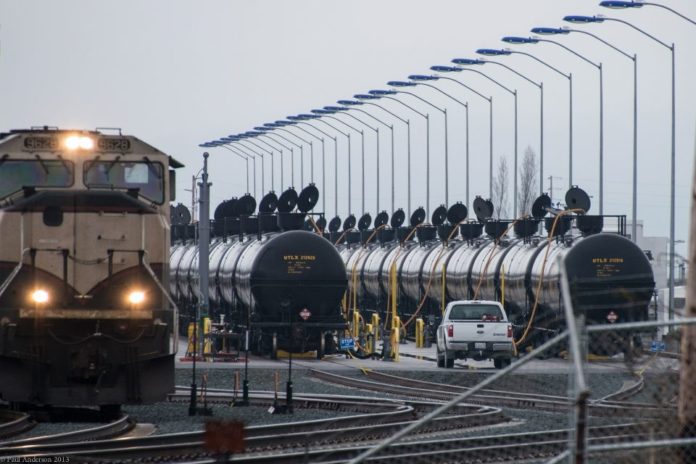“We do not believe that we have sufficient answers to the important questions regarding environmental and physical safety…” the statement read.
The port did indicate that future development could be revisited “once we have the confidence that transportation of crude oil by rail continues to meet all state, federal and local transportation rules and regulations and exhibits a sufficient accident-free record for a sustained period of time.”
Across the river from Portland, the Port of Vancouver USA approved a lease agreement last summer with Tesoro Savage to build a crude oil export terminal capable of shipping up to 360,000 barrels a day. The proposed terminal would require at least two, mile-and-a-half long unit trains per day.
Here is the full statement issued by the Port of Portland:
“Over the course of the last year, the Port of Portland has received numerous inquiries about our interest and capability to host facilities related to the storage and/or transfer of U.S.- and Canadian-produced crude oil arriving by rail. Interest in Port of Portland facilities is understandable given the Port’s considerable property ownership at the nexus of two transcontinental railroads and a deep-water navigation channel.
The sudden and remarkable transformation of North American oil production, derived from shale and oil sands, is driving much of this new activity. Oil production from the Bakken, as an example, has grown from 120,000 barrels per day in 2008 to more than one million barrels per day in 2013. Canadian oil imports to the U.S. have increased 57 percent over the last decade replacing imported oil from Mexico and Venezuela.
There are many benefits from this energy market transformation. Most importantly, eliminating dependence on foreign oil from countries that are unfriendly to the United States has significant and positive geo-political implications. A reduction in U.S. balance of payments, mitigation of the need to send American soldiers to defend national energy interests, as well as the obvious economic benefits of the U.S. acting as a global stabilizing force in the price of energy are all tangible examples of how North American energy production is a game-changer.
Domestic energy-intensive industries like steel and aluminum manufacturing and metal fabrication now have a global economic advantage due to lower energy input costs. No doubt, other U.S. manufacturing sectors will derive long term advantages due to dependable sources of low-cost natural gas, all derivatives from the oil production transformation now taking place. All of these energy developments are sure to offer considerable benefits for the United States and for Oregon.
Transport of crude oil by rail is key to this discussion because the U.S. refining capacity was historically developed to receive crude by ocean-going vessels. Transport capacity from production regions to refineries via pipeline is seriously constrained or non-existent, creating both demand and opportunity for large quantities of crude oil to move by rail.
At the same time, there are concerns regarding the safe transportation of crude oil by rail. Since 2008, there have been approximately 10 derailments. There have also been several recent events, particularly involving the transport of light Bakken crude oil in rail cars, which represent considerable cause for concern triggering a close examination of the transportation network. However, we note with interest the recent affirmative steps by the major North American railroads to begin addressing some of these issues, including lowering train speed, a call for safer train cars, increases in track inspections and increases in emergency response training.
Many in our community and elsewhere around the country might take the position that transportation of any carbon whose ultimate use is for combustion is undesirable because of the cumulative impacts such combustion may have on the climate. National and local discussion on carbon-based fuel use is sometimes simplified to an opposition to any use due to concerns over greenhouse gas emissions. We believe the subject is more complex than that for a couple of reasons:
1) The single most significant factor in the reduction in the growth of greenhouse gases over the last few years in the U.S. has been the substitution of natural gas as a replacement for coal.
2) The U.S. economy and our daily use of various fossil-fuel-based transportation modes such as automobiles, trains, buses and airplanes require a balanced approach to powering America while continuing to improve environmental conditions.
Thus, the Port believes that we must continue to look at the entire supply chain for energy on which we remain so dependent. Many efforts are underway to reduce that dependence and they are commendable but the achievements in terms of overall consumption remains fairly modest.
The Port is interested in being part of an American energy renaissance brought on by this remarkable domestic oil transformation. However, we do not believe that we have sufficient answers to the important questions regarding environmental and physical safety to proceed with any type of development at this time.
We, like the rest of those monitoring this energy transformation – which includes our state, city, and local communities – are following developments with interest and, where appropriate, will engage with policy makers, our community, and the transportation industry to ensure that the important issues surrounding the safe and secure transportation of these products are fully addressed.
Our interest will begin to grow once we have the confidence that transportation of crude oil by rail continues to meet all state, federal and local transportation rules and regulations and exhibits a sufficient accident-free record for a sustained period of time.
The Port of Portland’s mission is to enhance the region’s economy and quality of life by providing efficient cargo and air passenger access to national and global markets. In support of this mission, we are closely monitoring developments in the crude-oil-by-rail market and will continue to stay informed about the steps the rail industry and others are taking to provide for the safe and efficient transportation of crude-oil. This will ensure that the planning for facilities that accommodate such cargoes can be developed with appropriate safety, regulatory and environmental protection standards.”









